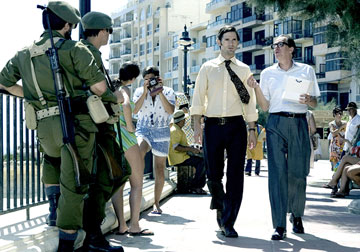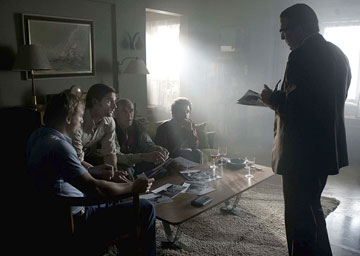

One of the great things about Steven Spielberg is that he will always strive to do something different. He moves easily between action, science fiction, serious drama, and even a few recent jaunt into light comedy. Because he is such a good director, it's a safe bet that the movies will be good, or at least above average in terms of enjoyability. But Spielberg (War of the Worlds, The Terminal) is a better filmmaker, so it's given that technically, his films are superb. Munich is another foray into drama tinged with a lot of social commentary. The film, adapted by Tony Kushner from the book Vengeance by George Jonas, details the covert plan that Israel's Mossad had to assassinate the men from the terrorist group Black September they believed were responsible for the killing of eleven Israeli athletes at the 1972 Munich Olympics. This alone is a good setup for an action movie, but Spielberg goes one step further; he uses Munich as a meditation on violence and the effect it can have on a person.
Spielberg shows this profound change upon Avner (Eric Bana, Troy, Hulk), a Mossad Agent. Another agent, Ephraim (Geoffrey Rush, Intolerable Cruelty, Pirates of the Caribbean) asks him to undertake a secret mission for Israel. It is so sensitive that most of the Israeli intelligence community will have no knowledge of it. Avner must resign from Mossad to ensure his cover, and the Israel's deniability. He and a team of men will be given a near unlimited supply of funds to located and kill the Palestinian suspects within the bounds of non-Communist Europe. Muslim countries are strictly forbidden. Worse, the mission could possibly take years, and Avner has a child on the way. Because he is a patriotic soldier, he accepts.
Avner and his group make their base in Europe and begin the slow process of tracking down information and killing their men. Where most movies would skimp over the preparation, Spielberg revels in it, sometimes a bit too much. He shows the men go through the minutiae of planning an assassination; from staking out locations to planting bombs. Avner's men have differing opinions on the best ways to carry out their mission, Steve (Daniel Craig, The Jacket, Layer Cake) wants the direct route with guns, and Carl (Ciarin Hinds, The Phantom of the Opera, The Statement) prefers much more restraint than may be possible. The constant thinking and rethinking is maddening, and all of the men are clearly rattled when things do not go as simply as planned. Initially, they want no collateral damage, but each man becomes a bit more jaded with each hit. Worse, Avner feels like a mere pawn in a greater game. He is buying information from unknown sources. Could this source be selling information about him? What kind of father (or human being, for that matter) does this continual killing make him?
The casting is also impressive. Spielberg assembled a great international cast from countries like Israel, France, and Germany, with some people appearing on screen for mere minutes. Actors like Hind, Ayelet Zurer (Nina's Tragedies), Mathieu Amalric (Kings and Queen), Mathieu Kassovitz (Amen), Yvan Attal (Happily Ever After), Valeria Bruni Tedeschi (Cote d'Azur), Marie-Josee Croze (Taking Lives), Moritz Bleibtreu (The Keeper), Hanns Zischler (The Edukators) and a host of others have roles that range from supporting to one or two lines, but their inclusion does bring a larger sense of believability to Avner's globetrotting, especially since Spielberg didn't have to cast these people.
Spielberg manages to keep Munich both thoughtful and intense. Avner is coasting along in some waking nightmare, punctuated by periodic explosions and bursts of gunfire. Every additional incident makes him increasingly paranoid and further eats away at his humanity. The viewer realizes how much Avner has lost when he adopts a particular habit that Carl told him about in a story. And with each successive death, Avner feels a sense of futility. Black September quickly replaces each of their losses. At the same time, they are also retaliating against Israelis. Avner sees no end to this cycle. It is easy enough to show gruesome violence on screen. It is rare that a director takes the time to place the violence in context and craft an anti-violence message around it. He even manages to throw in a few philosophical debates without sounding preachy.